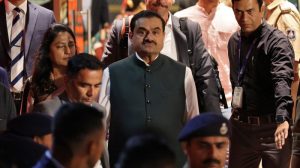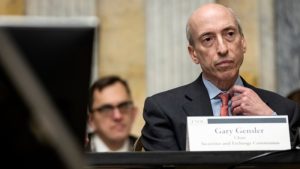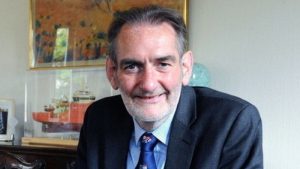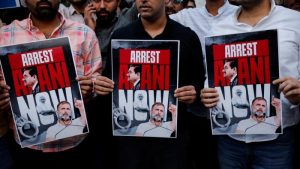The minister taking a chainsaw to Argentina’s statute book
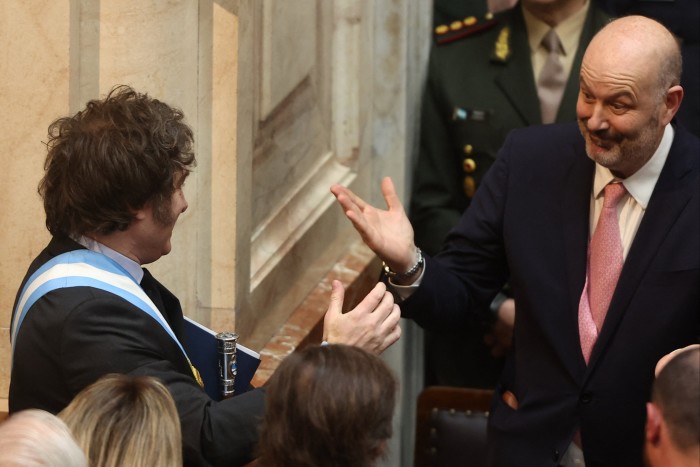
Unlock the Editor’s Digest for free
Roula Khalaf, Editor of the FT, selects her favourite stories in this weekly newsletter.
Federico Sturzenegger has a big ambition: to turn Argentina from one of the world’s most heavily regulated countries into the freest economy on the planet. The deregulation minister’s target: the country’s entire statute book.
Appointed by President Javier Milei following the libertarian leader’s election victory a year ago, Sturzenegger has sorted all of the South American nation’s roughly 4,200 laws into three categories: scrap, change or keep.
“The worse the society, the more law there will be. In hell, there is only law,” Sturzenegger, former head of Argentina’s central bank, told the Financial Times, quoting the late US law professor Grant Gilmore. “We are going to take all that apart,” the minister added.
He has his work cut out as Milei seeks to fulfil his election pledge to “take a chainsaw to the state”. Argentina languishes in 145th place on US think-tank Heritage Foundation’s Index of Economic Freedom, below Uganda and above Pakistan.
Milei’s La Libertad Avanza party also has only a small minority in both chambers of congress, forcing the government to cobble together ad hoc coalitions to pass laws.

To get around this in the short term, Milei in June persuaded congress to grant him emergency powers for a year and to pass a wide-ranging “omnibus law”. The president also issued a sweeping emergency decree striking down or modifying more than 300 regulations in December.
The moves opened the way for him to fulfil his campaign promise by decreeing changes and restructuring the government without needing legislative approval each time. He hopes to win a much bigger legislative bloc in midterm elections next October.
“This delegation [of power] was extraordinarily broad,” Sturzenegger told the FT. “You can close [government] entities, you can restructure practically any part of the public administration.”
The result has been a bold experiment in free-market shock therapy. Milei has slashed the budget deficit from about 5 per cent of GDP to zero almost overnight through measures such as halting all capital spending and raising pensions and government salaries by less than Argentina’s inflation rate, which reached 209 per cent in the year to the end of September, the most recent figure available.
But economists and opposition politicians question how sustainable some of the president’s cuts are.
JPMorgan warned in a recent research note of “more limited room to continue adjusting expenditures” next year. “The decline in real pensions and . . . wages is likely not to be repeated next (election) year, with inflation trending lower, while capital spending and transfers to provinces are already [at] historical lows,” it said.
“I don’t see that they’re leaving a better state,” said Martín Lousteau, a centrist figure in the opposition Radical party. Milei “has the idea that Argentina can lower public spending by [another] 13 points of GDP and that will set free more productive forces. I don’t think that path is possible”.
Sturzenegger, an MIT-trained economist, said 15 per cent of Argentina’s laws needed to be scrapped and another 15 per cent modified. The minister has also trained his sights on a thicket of secondary decrees and regulations, many of which he said made no sense for consumers and held the economy back.
The government has deregulated bus and air travel, simplified divorce, ended rent controls, forced state healthcare providers to prescribe cheaper generic drugs instead of branded ones and made it easier to enforce contracts denominated in US dollars.
“Everywhere where we have deregulated there have been significant falls in the real price of goods,” Sturzenegger claimed.
Among the most arcane rules the minister cited as ripe for the axe is a regulation obliging importers to summon a representative of the local company making the same product when they bring the goods into the country.
“Argentina is trapped in a Bermuda triangle,” Sturzenegger said, noting its “three vertices” were “the business caste, which has made Argentina the second-most closed [market] in the world”, the unions and the left-leaning Peronist party, which ruled Argentina for most of the 41 years since it returned to democracy in 1983.
“I call the Peronist party the Argentine Conservative party,” the minister said. “It’s the party of interest groups, the party which will defend the interests of unions and the interests of big business to the detriment of the population in general.”
But Peronist leaders claim that many Argentines want a bigger and better state rather than Milei’s pared-back alternative.
“Nothing Milei has said . . . represents the deeply held ideas of Argentine society,” Axel Kicillof, the Peronist governor of Buenos Aires province, told the FT last month. “His victory was about . . . dissatisfaction and anger with politics, which is not exclusive to Argentina.”
So far, however, opposition to the libertarian reform drive from a public weary of government waste and corruption has been more muted than many analysts predicted. Despite labour unions calling regular protests and short strikes, only a couple have drawn wider public support.
“The [deregulation] agenda is not just an agenda of freedom,” Sturzenegger said. “We believe that free people trading freely will find the best deals for both sides.”
#minister #chainsaw #Argentinas #statute #book
